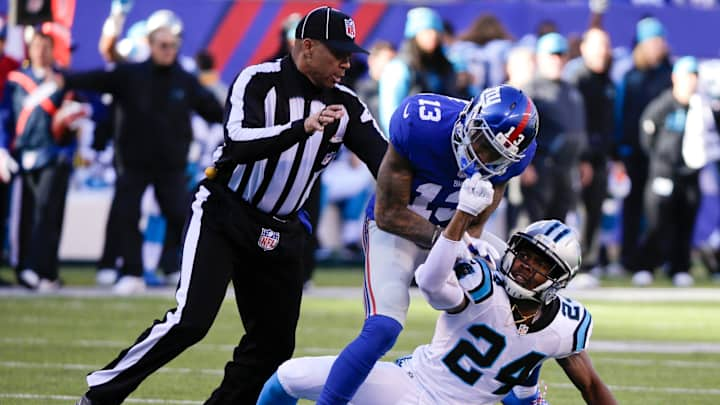Column: The head-slapping better not stop with Beckham Jr.

Every NFL fan has their most notorious botched call.
More than a few settled on a new No. 1 after watching Giants receiver Odell Beckham Jr., try to separate Panthers cornerback Josh Norman from his senses in the third quarter of Sunday's game, and get flagged for nothing more serious than unsportsmanlike conduct on the spot.
Not me. My all-time blown call remains that August 2006 afternoon when the league's owners met at a suburban Chicago hotel and elected Roger Goodell as commissioner.
In hindsight, we shouldn't be surprised by a) how much money they all made in the interim; or b) what a hash Goodell has made of the game. Moments after the formal announcement, Goodell told reporters he was killing time in his hotel room while the debate went on downstairs, and that he was surprised when Steelers owner Dan Rooney knocked on his door with the good news.
''Thankfully, I had just finished putting my pants back on,'' Goodell recalled at the time, laughing.
Nobody is laughing now. That slapdash approach to issues large and small has been the hallmark of Goodell's tenure as league boss.
He often seems to be making policy up as he goes along, wavering between the two poles of public relations and the bottom line. You could argue the NFL's runaway success has been as much in spite of him - remember how he handled the various ''-gate'' controversies and domestic violence cases - as because of him.
The commissioner of the NFL has two overarching priorities: player safety, and the integrity of the game. It's rare when a single play highlights the lack of progress on both fronts, but it's not entirely a coincidence, either. The timing is fortuitous as well.
The soon-to-be-released movie ''Concussion'' will remind us how genuinely committed the NFL is to player safety, while it's still way-too-cozy relationship with fantasy sports gambling reveals the anything-for-a-buck mentality that holds sway at headquarters.
Suspending Beckham for one game, as the NFL did Monday, solves nothing in the long run. There may be further punishment; Norman, for his role in the head-slapping that went on all game; and referee Terry McAulay and his crew for allowing it to continue that long. While we're at it, Giants coach Tom Coughlin needs a talking-to for not yanking Beckham out of the game, but that's a club matter.
What Beckham exposed by taking a lengthy run-up, then launching himself at the earhole of Norman's helmet with bad intent, was a system-wide failure. It begins with the player, to be sure. But it extends through the officials on the field, then up to the skybox where a NFL-mandated concussion spotter sat, then back to the league's gleaming ''command center'' in New York where TV sets, replay machines and a crew supervised by vice president of officiating Dean Blandino are supposed to be getting it right.
And all of them got it wrong.
But the buck shouldn't stop there.
Under Goodell, the league has responded to both the concussion and integrity issues with a pants-on-fire approach. Nearly every time a controversial call affects the outcome of a game, the league disciplines the officials involved, starts tinkering with the rulebook - witness the still-evolving definition of what constitutes a catch - and hopes everyone else has a short memory.
Instant replay has intimidated officials, who still get upward of 95 percent of the calls on the field right, and the league never stops undermining them. Remember the 2012 refs lockout, when the NFL tried to pawn off 115 replacements whose pro experience consisted of a few training sessions?
''I'm glad I got out when I did,'' Scott Green, who retired as an NFL official in 2013, a year after leading the negotiations on the officials' side, said in a telephone interview Monday.
Green was involved in his share of controversial calls during his dozen years in the league. ''Those go with the territory,'' he said, ''but when a guy on the couch at home has a better view than we do, well, you're seeing now the kind of snowball effect it has.''
In a USA Today editorial last month, Green urged Goodell to offer more effective training, and even more important, to change his standard approach - ''arbitrary punishment of an individual for a fast public-relations fix.''
But Green also argued the NFL had failed to use the single-most effective tool the league has in its possession already: the command center in New York.
Currently, only the officials on the field can decide to suspend a player. A league spokesman confirmed Monday refs can discuss replays with the command center, but can't receive advice on what the appropriate penalty should be.
''I don't understand that,'' Green said. ''Somebody should have said something. We've seen a few situations already -think back to the clock malfunctioning in San Diego - where something was a rule until it's not.
''If you're reviewing plays and you're already talking to the ref, why not, especially with the emphasis on concussions these days, if you're trying to demonstrate you're serious ... why somebody wouldn't have said, `He needs to be gone.'''
Why not indeed?
---
Jim Litke is a national sports columnist for The Associated Press. Write to him at jlitke(at)ap.org and follow him at Twitter.com/JimLitke.
